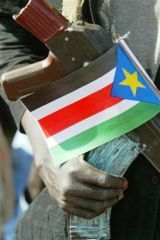Garang says southerners must help settle other Sudanese conflicts
By RODRIQUE NGOWI, Associated Press Writer
RUMBEK, Sudan, Jan 22, 2005 (AP) — Sudan’s main rebel leader told his supporters at a rally Saturday that with a deal ending two decades of fighting in southern Sudan now in place, those living in the south will have to help negotiate settlements to other conflicts in the country.

|
|
A soldier holds a flag of the Sudan People’s Liberation Army with his assault rifle as their leader John Garang arrives, Saturday, Jan. 22, 2005 in Rumbek in southern Sudan. (AP). |
John Garang, leader of the Sudan People’s Liberation Army, arrived at the rebel group’s headquarters in Rumbek Saturday for the first time since signing a comprehensive peace deal two weeks ago in neighboring Kenya.
He is set to chair a meeting of the rebels’ legislative body, the National Liberation Council, which is expected to endorse a Jan. 9 peace deal with Sudan’s government.
Monday is the deadline set in the agreement for both sides to have their respective legislatures approve the deal.
“The peace that we have brought is not our peace alone. It is peace for Sudan, it is peace for all regions, it is peace for Africa,” Garang told hundreds of supporters at a rally.
“We will also have to ensure it is also peace for Darfur and for eastern Sudan,” he said, referring to a low intensity conflict in the Red Hills area of eastern Sudan between the government and the Bejya Congress.
The agreement Garang signed with Sudanese Vice President Ali Osman Mohamed Taha does not cover the separate conflicts in Sudan’s western region of Darfur and in the country’s east.
Two million people died during the war in southern Sudan, mainly from war-induced famine and disease.
Since Sudan won independence in 1956 from Britain and Egypt, Arab Muslims, who dominate the north, have led the government, which has fought the rebels, who want greater autonomy and a greater share of the country’s wealth in the mainly black animist and Christian south.
Diplomats and analysts have said that the almost two-year Darfur conflict also endangers the difficult reconciliation process between north and south.
Hardships including disease and malnutrition are believed to have killed more than 70,000 of the displaced within Darfur since March. Many more have been killed in fighting since the conflict broke out in February 2003, although no firm estimate of the direct toll of the war exists.
Some senior rebel leaders warned the people of southern Sudan that the peace agreement marks the beginning of the even more difficult task of rebuilding the troubled region.
Jan Pronk, the U.N. chief envoy in Sudan, pledged to help the southern Sudanese remove land mines, return to their homes, demobilize and disarm combatants as well as rebuild the region’s infrastructure.
Upon his arrival in Rumbek, Garang stepped over a white cow that had been slaughtered on the tarmac as he got off the plane. A white cow is considered a peace offering among Garang’s Dinka tribe in southern Sudan.
He then inspected a guard of honor by SPLA fighters as hundreds of residents who had gathered at the dusty airstrip tried to catch a glimpse of him and his wife.
Some of them clung precariously to tree branches while others clambered on top of the fuselage of an aircraft that crashed here three years ago.
“Our first task is to ratify the agreement. That’s why we have come to Rumbek. The same thing will be done in Khartoum (the seat of Sudan’s government),” he said.
Before Garang’s arrival, a senior rebel commander said that his fellow commanders objected strongly to reports that Jordan and Egypt have offered to contribute troops to a U.N. peacekeeping mission because the two countries supported the Sudanese government during the southern conflict.
Garang is set to meet Pronk to discuss the proposed peacekeeping mission. Its composition will be clear only when the U.N. Security Council passes a resolution to give it a mandate.
